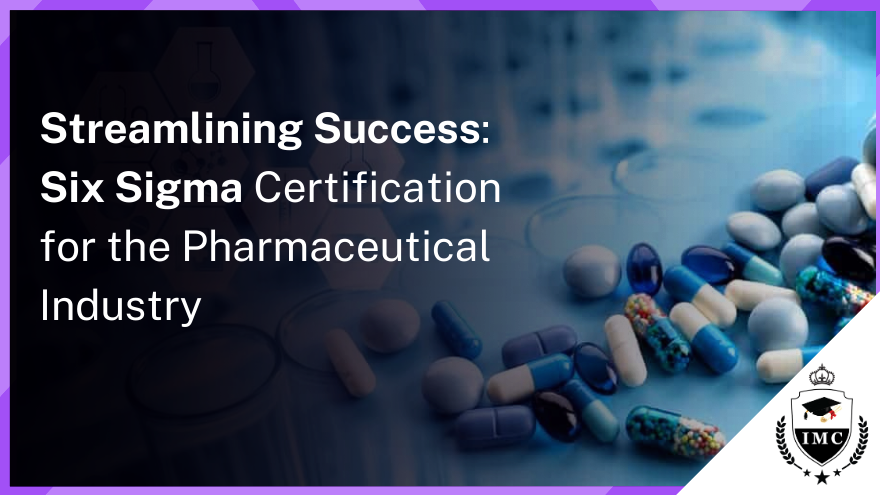Welcome to a transformative journey in the pharmaceutical realm, where excellence meets efficiency through Six Sigma Certification. In this blog, we dissect the significance, process, and myriad benefits of implementing Six Sigma in the Pharmaceutical Industry. Let's delve into the world of near-perfection and continuous improvement. Defining Six Sigma in Pharmaceutical Manufacturing Six Sigma, a statistical measure of near-perfection, sets the stage for achieving six standard deviations between the mean and the nearest specification limit. In the Pharmaceutical Industry, this methodology becomes a potent force, driving continuous improvement and elevating customer satisfaction.
Importance of Six Sigma in the Pharmaceutical Industry
Improved Quality Control:
Identify and eliminate defects, ensuring higher product quality and increased customer satisfaction.
Increased Efficiency:
Streamline processes, cut down on waste, reduce production costs, and enhance overall efficiency.
Compliance with Regulations:
Navigate the highly regulated pharmaceutical landscape with a systematic and data-driven approach to quality control.
Better Decision Making:
Provide data and insights for informed decision-making, reducing risks and boosting competitiveness.
Enhanced Customer Satisfaction:
Deliver high-quality products that meet customer needs, leading to increased satisfaction and loyalty. Six Sigma emerges as a pivotal methodology for the pharmaceutical sector, addressing quality, efficiency, compliance, decision-making, and customer satisfaction.
Six Sigma Methodologies in Pharmaceutical Manufacturing
DMAIC (Define, Measure, Analyze, Improve, Control) The backbone of Six Sigma, DMAIC, plays a crucial role in improving existing processes. From defining the problem to monitoring improvements, this methodology ensures a systematic approach.
Design for Six Sigma (DFSS)
DFSS focuses on designing defect-free processes or products from the outset. Employing tools like risk analysis and failure mode and effects analysis (FMEA), it identifies and mitigates potential defects before launch.
Lean Six Sigma
Combining Lean Manufacturing and Six Sigma principles, this methodology targets waste reduction and efficiency improvement. It finds applications in streamlining processes such as drug development, clinical trials, and production.
Lean Six Sigma Green Belt Training & Certification at IMC Institute
Embark on a transformative learning experience tailored for pharmaceutical professionals at IMC Institute. Our comprehensive curriculum, hands-on projects, and global recognition pave the way for excellence in Lean Six Sigma methodologies.
Challenges and Best Practices in Six Sigma Implementation for Pharmaceuticals
Challenges Resistance to Change:
Overcome established processes and procedures, fostering acceptance among employees.
- Lack of Upper Management Buy-in: Communicate the value of Six Sigma to executives, involving them in the process.
- Limited Resources: Allocate sufficient time, money, and personnel for successful implementation.
- Complex Regulatory Environment: Navigate regulations meticulously, ensuring compliance throughout the process.
- Maintaining Quality Control: Implement measures to sustain quality amid process changes.
- Data Collection and Analysis: Overcome data collection challenges, ensuring accuracy and reliability.
Best Practices Employee Involvement:
- Engage employees in the process, encouraging feedback and suggestions.
- Upper Management Support: Communicate benefits to executives, providing training for a clear understanding.
- Resource Allocation: Ensure availability and proper allocation of time, money, and personnel.
- Regulatory Compliance: Align Six Sigma implementation with regulations, seeking legal advice when needed.
- Quality Control Measures: Integrate quality control measures throughout the Six Sigma process.
- Data-Driven Decision Making: Utilize data for informed decision-making, involving data analysts and experts.
Certification Training For you and your Teams Around the World:
IMC Institute Provides live virtual instructor-led corporate training programs customized for enterprise teams who wish to train their employees on specific aspects of their job processes or responsibilities. The corporate training by our expert certified trainers will enhance your learning curve and enable your teams to utilize their skills to meet industry standards.
- Experienced & Industry Specific Trainers
- Lifetime LMS access
- Deliver sessions across continents
- Virtual Instructor-Led Training
- Customized Training
Six Sigma Certification Levels:
Six Sigma Green Belt Certification:
This is the entry-level Six Sigma certification. Green Belts are typically responsible for leading Six Sigma projects and implementing Six Sigma tools and techniques.
Six Sigma Black Belt Certification:
This is the intermediate level Six Sigma certification. Black Belts are typically responsible for leading Six Sigma projects and developing Six Sigma methodologies.
Six Sigma Master Black Belt Certification:
This is the highest level Six Sigma certification. Master Black Belts are typically responsible for leading Six Sigma programs and developing Six Sigma strategies. The Future of Six Sigma in the Production Industry Six Sigma is a proven methodology that can help production industry companies improve their quality, efficiency, and profitability. As the production industry continues to evolve, Six Sigma will likely become even more important. Companies that are looking to stay ahead of the competition should consider investing in Six Sigma certification.
Summary
As the pharmaceutical industry continues to evolve, Six Sigma stands as a proven methodology for elevating quality, efficiency, and profitability. Embrace Six Sigma Certification for a journey of continuous improvement, reduced waste, and enhanced patient outcomes. IMC Institute is your gateway to mastering Six Sigma—enroll now for a transformative career in pharmaceutical excellence.






